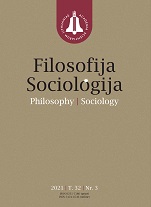Aktyvios įtraukties apribojimai ir socialinių paslaugų vaidmuo: Lietuvos atvejis
Restrictions on Active Inclusion and the Role of Social Services: The Case of Lithuania
Author(s): Boguslavas Gruževskis, Sandra Krutulienė, Rasa MiežienėSubject(s): Labor relations, Sociology of the arts, business, education, Economic development, Identity of Collectives
Published by: Lietuvos mokslų akademijos leidykla
Keywords: active inclusion; inclusive labour market; social services; social policy;
Summary/Abstract: The use of active inclusion (AI) policies is steadily growing worldwide, especially among developed (OECD) countries. This concept is most consistently applied in EU countries, with some countries spending more than 1% of their GDP on the activation policies. This concept is also well-known in the countries of the American continent, where it stands as the basis of the workfare model. The concept of AI is linked to the promotion of social inclusion and participation in the labour market for people of working age experiencing poverty or social exclusion. This article is the second work of the authors analysing the concept of AI and its implementation in Lithuania. The article analyses the content of AI concept, placing more emphasis on the limitations of AI and criticism from the right-wing and the left-wing politicians. The article also examines the issue of social services and their place in the concept of AI. The empirical part of the article analyses different dimensions of social services in Lithuania during the period from 2009 to 2018(9). On the basis of the performed analysis, it is concluded that the availability of enabling services in Lithuania is insufficient, despite the fact that positive changes in the availability and coverage of the above-mentioned services have been observed since 2009.
Journal: Filosofija. Sociologija
- Issue Year: 32/2021
- Issue No: 2
- Page Range: 105-117
- Page Count: 13
- Language: Lithuanian

